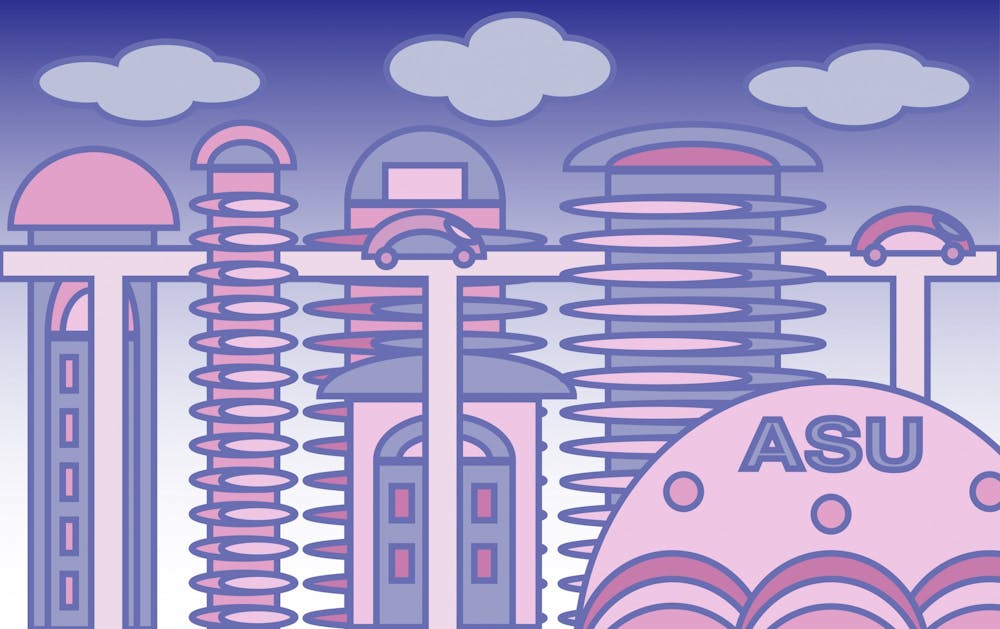ASU is a founding member of a new "smart region initiative" to bring cities and towns together in the Phoenix area together to collaboratively solve challenges and problems using technology.
The city of Phoenix is one of the fastest growing cities in the country, but according to Diana Bowman, the associate dean for international engagement in the Sandra Day O'Connor College of Law, the metropolitan region is not up to date in terms of becoming a smart city.
“The greater Phoenix area is well behind the ball,” Bowman said.
Bowman said that the goal of The Connective is to “improve quality of life” in the greater Phoenix area.
“It’s not about the technology, it’s about the ... individual,” Bowman said.
In 2020, members of The Connective have started working with different towns and cities in the greater Phoenix region to get an understanding of what issues they are facing.
The Connective will be working with partners in both the public and private sectors to combat those challenges, whether it be parking, water, transportation or other issues.
The 22 partners that make up The Connective, include Dell, Cox, Sprint and The Salt River Project.
Bowman said ASU's role in the partnership will be accelerating the development of necessary technology by using its campuses to test and research in a sort of “sandbox” environment.
“ASU is really critical in terms of the idea of co-creating and testing technology, and the technology partners are already on board to help refine and drive it into the market,” Bowman said.
Dominic Papa, vice president for smart state initiatives at the Arizona Commerce Authority, said that the problem prior to The Connective was that cities were never really great at working together.
Papa said cities tend to focus on helping themselves and ultimately don’t have the time or resources to do more, causing various urban problems like pedestrian fatalities and a lack of mobility.
“These challenges don’t stop at municipal borders,” Papa said. “And in order to solve these challenges, we really need to take a holistic and collaborative approach, and The Connective is the tool to solve that.”
Papa said that with the help of ASU’s faculty and student research, the necessary bandwidth is covered and the work can actually get started.
“ASU helps provide the fundamental research to help drive and accelerate commercialization in certain industries,” Papa said. “We rely heavily on the University to provide the innovation and research to advance industries within Arizona.”
Stephane Frijia, senior vice president of strategy at the Greater Phoenix Economic Council, said that while the goal was to get the cities and towns to collaborate with each other, it was also important to “allow cities to think bigger.”
Oftentimes companies come in and try to aid the cities with their technology, Frijia said, but the cities are not equipped to handle what each company tries to do and to integrate it with existing systems.
“The purpose was to help shed light on what we don’t know and adopting the right type of technology to fix the city’s specific needs,” Frijia said.
Brian Dean, program manager for The Connective and co-founder & director of operations at the Institute for Digital Progress, said that historically, cities have competed with each other in terms of their priorities.
“Existing smart cities will focus more on one big project like changing all their lights to LED lights, but what we are really doing enables the collaboration between all the groups to launch all kinds of projects,” Dean said.
The Connective brings the "unbiased conveners" and provides the help and know-how to deliver on what the cities actually want.
“We do not tell the cities what they should be doing,” Dean said. “We take the outputs of what the cities have decided and run with it on their behalf.”
Dean said The Connective is focusing more on creating a blueprint for the type of collaboration that has already been cultivated to make the greater Phoenix area a smart region.
“We can actually create the framework where when one system has been solved in one city, it's easily scaled and implemented into the others,” Dean said.
Reach the reporter at ljchatha@asu.edu and follow @LukeJC2 on Twitter.
Like The State Press on Facebook and follow @statepress on Twitter.
Continue supporting student journalism and
donate to The State Press today.





